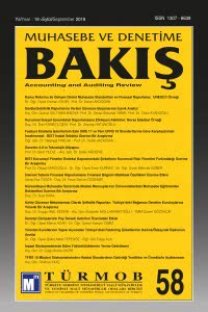BİR YILDAN UZUN ÖLÇÜM DÖNEMLERİNİN DÜZEY VE DEĞİŞİM MODELLERİ AÇISINDAN MUHASEBE KARLARI İLE HİSSE SENEDİ FİYATLARI ARASINDAKİ İLİŞKİ ÜZERİNE ETKİSİ
Bu çalışma 1992-2000 döneminde farklı portföy zamanlarında İstanbul Menkul Kıymetler Borsası'nda İMKB gözlenen, muhasebe kârları ve hisse senedi getirileri arasındaki ilişkinin nasıl etkilendiğiyle ilgili deneysel kanıtlar sağlamaktadır. Bulgulara göre getiri ve değişim modelleri açısından kâr ve getiri arasındaki ilişkinin açıklanmasında birden daha uzun portföy dönemlerinin esas alınması, her iki model açısından da önemli bir R2 artışı sağlamaktadır. Çalışmadan elde edilen sonuçlar son mali tablolardaki kârların içerdiği bilginin, o döneminhisse senedi fiyatlarına tam olarak yansımadığı yönündeki bulguları güçlendirmektedir
The Effects of Longer than One Year Measurement Periods on Accounting Earnings-Stock Prices Relation for Level and Change Models
This study provides new evidence on how the relationship in different portfolio times between stock returns and accounting earnings affects the observed Istanbul Stock Exchange ISE returns-earnings relation in 1992- 2000 periods. Results indicate that more than one year portfolio periods seriously increase R2 in returns-earnings relation for return and change models. Findings which are provided the study strengthen evidence that stock prices at the end of period do not include all information of earnings at the last statements.
___
- ● Ball, R. and Brown, P., “An Emprical Evaluation of Accounting Income Numbers”, Journal of Accounting Research, Autumn 1968, ss.159-178.
- ● Beaver, W.H., Financial Reporting: An Accounting Revolution, Prentice-Hall, 1981.
- ● Beaver, W.H., Lambert, R., and D. Morse., “The Informational Content of Security Prices”, Journal of Accounting and Economics, 1980, Vol.2, ss.2-28.
- ● Bernard, V., “Capital Market Research in the 1980's: A critical review”, Golden Jubilee Symposium, University of Illinois, 1989.
- ● Brennan, M., “A perspective on accounting and stock prices”, The Accounting Review, January 1991, ss.67-79.
- ● Cho J. J. and Jung K. (1991), “Earnings Response Coefficients: A Synthesis of Theory and Empirical Evi - dence”, Journal of Accounting Literature, 1991, Vol.10, ss.85-116.
- ● Christie, A.A., “On cross-sectional analysis in accounting research”, Journal of Accounting and Economics, 1987, Vol.9, ss.231-258.
- ● Collins, D., and Kothari, S., “An analysis of Inter-Temporal and Cross-Sectional Determinants of Earnings Response Coefficients”, Journal of Accounting and Economics, March 1989, ss.143-181.
- ● Collins, D., Kothari, S., Shanken, J. and Sloan, R., “Lack of timeliness and noise as explanations for the low contemporaneous return-earnings association”, Journal of Accounting and Economics, November 1994, ss.289-324.
- ● Dechow, P., “Accounting earnings and cash flows as measures of firm performance: the role of accounting accruals”, Journal of Accounting and Economics, 1994, Vol:18, ss.3-42.
- ● Dumontier, P. and Raffournier, B., “Accounting and capital markets: a survey of the European evidence”, The European Accounting Review, 2002, Vol.11:1, ss.119-151.
- ● Dumontier, Pascal and Labelle, Réal., “Accounting earning and firm valuation: the French case”, The European Accounting Review, 1998, Vol:7:2, ss.163-183.
- ● Easton, P.D., Harris, T.D. and Ohlson, J.A., “Aggregate accounting earnings can explain most of security re - turns”, Journal of Accounting Research, Spring 1991, ss.19-36.
- ● Easton, Peter, D. and Haris, Trevor, D., “Earnings as an Explanatory Variable for Returns”, Journal of Accounting Research, Spring 1991, ss.19-36.
- ● Jindrichovska, Irena., “The relationship between accounting numbers and returns: some emprical evidence from the emerging market of the Czech Republic”, The European Accounting Review, 2001, Vol.10:1, ss.107-131.
- ● Kormendi, R., and Lipe, R., “Earnings Innovations, Earnings Persistence, and Stock Returns”, Journal of Business, 1987, Vol.60, No.3, ss.323-345.
- ● Kothari, S. P., Price-earnings regressions in the presence of prices leading earnings: earnings level versus change specifications and alternative deflators”, Journal of Accounting and Economics, June 1992, ss.173- 202.
- ● Kothari, S. P. and Sloan, R. G., “Information in Prices about Future Earnings”, Journal of Accounting and Economics, 1992, Vol.15, ss.143-171.
- ● Kothari, S.P. and Zimmerman, J.L., “Price and Return Models”, Journal of Accounting and Economics, 1995, Vol.20, ss.155-192.
- ● Kothari, S.P., “Capital markets research in accounting”, Journal of Accounting and Economics, 2001, Vol.31, ss.105-231.
- ● Lev, B., “On the Usefulness of Earnings and Earnings Research: Lessons and Directions…”, Journal Of Accounting Research, Supplement 1989, ss.153-192.
- ● Lipe, R., “The Relation between Stock Returns and Accounting Earnings Given Alternative Information”, Accounting Review, January 1990, ss.49-71.
- ● Luberrink, M.J.P., “Financial Statement Information, The Impact of Investors and Managers, Dissertion”, Doktora Tezi, University of Groningen, 2000.
- ● Ohlson, J. A., “The theory of value and earnings, and introduction to the Ball-Brown analysis”, Contempo - rary Accounting Research, March 1991, ss.1-20.
- ● Özer, Gökhan., “Firma değerlemesinde muhasebe kârlarının rolü: İMKB'de deneysel bir araştırma”, İktisat İşletme ve Finans, Aralık 2002, ss.112-122.
- ● Özer, Gökhan., Muhasebe Kârları İle Hisse Senedi Verimleri Arasındaki İlişkiler, SPK Yayınları, Yay.No.31, 1996.
- ● Pritchard, Neringa J., “The relationship between Accounting Numbers and Returns in Baltic stock Markets”, Centre For Economic Reform and Transformation, www.som.hw.ac.uk, Discussion Paper, 2002, ss.1-34.
- ● Strong, N., “The relation between Returns and Earnings: Evidence for the UK”, Accounting and Business Research, 1993, Vol.24, No.3, ss.69-77.
- ● Warfield, T. D. and Wild, J. J., “Accounting recognition and the relevance of earnings as an explanatory variable for returns”, Accounting Review, October 1992, ss.25-37.
- ● Watts, R., Zimmerman, J., Positive Accounting Theory. Prentice-Hall, Englewood Cli., NJ, 1986
- ISSN: 1307-6639
- Yayın Aralığı: Yılda 3 Sayı
- Başlangıç: 2000
- Yayıncı: TÜRMOB
